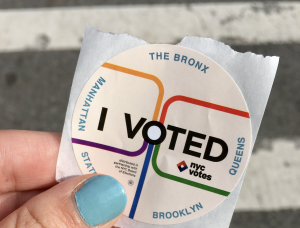New York Needs Election Reforms to Make the Ballot More Accessible
By Vanita Gupta and Debra Messing
The devastating coronavirus outbreak in New York is a public health tragedy made infinitely worse by long-standing systemic inequalities. And even as the state moves past its COVID-19 peak, New Yorkers stand to face yet another grave risk this fall: voter disenfranchisement.

Notwithstanding complications the virus poses for the upcoming election, New York already fared poorly in election administration — ranking as the 42nd worst state in which to cast a ballot. Part of this can be explained historically: More than a century ago, New York passed several laws requiring urban residents to regularly re-register (disproportionately affecting immigrants and people of color), prohibiting voter registration on Saturdays (targeting Jews), and imposing literacy requirements (predominantly affecting Puerto Rican newcomers). Due to this discriminatory past, three counties — the Bronx, Queens, and Manhattan — were included in the Voting Rights Act’s preclearance formula, requiring them to seek federal approval before altering any voting laws or practices.
That worked well, for the most part. In 2013, the Supreme Court struck down that part of the law, nevertheless acknowledging that discrimination in the country persists. Since then, these counties — in addition to other states and jurisdictions across the nation — have made changes without any oversight at all, sometimes with discriminatory aim and/or consequences.
That’s why, for the last three federal elections, New York defaulted to some of its old habits, purging otherwise eligible voters from registration lists and running elections in a way that left citizens waiting for hours (a form of disenfranchisement in itself). Given these practices, it’s no shock that voters of color — the same people who are disproportionately hit by COVID-19 — are more often denied access to the ballot.
But it’s not all bad. Thanks to the work of lawyers, advocates, and key legislators, New York passed several election reforms in 2019: nine days of early in-person voting, pre-registration for teens, and unified federal and local primaries (New York was the last state to come around on this one). It’s a much-needed start, but more needs to be done to improve the state’s ranking and provide all New Yorkers with fair access to the polls. Lawmakers must work to enact several practices known to facilitate registration and boost turnout: online, automatic, and same day registration; weeks-long early in-person voting coupled with same day registration; and no-excuse absentee voting administered in conjunction with in-person polling options.
COVID-19 has prompted some positive movement, as evidenced by Governor Cuomo’s executive order expanding absentee voting for the June primary. It goes without saying that the governor must extend this order through the November election, as epidemiologists predict a second wave of the virus in the fall. No American — no New Yorker — should have to decide between safety and civic duty.
The welfare of our nation depends on collective participation in this democracy and on our mutual protection of one another’s health and well-being. But accessibility to our democracy, particularly for voters of color who are already politically underrepresented and working on the front lines to safeguard the country’s health and economy, should extend well beyond our current crisis. Pandemic or not, the country — including the state of New York — suffers when people are stymied from regularly participating and contributing.
To make lasting change beyond COVID-19, New York can and must institute election reforms making the ballot more accessible. As it stands, no-excuse absentee balloting would require an amendment to the New York Constitution, and several pro-reform groups are supporting bills moving in the Senate to loosen restrictive absentee ballot requirements for pandemic purposes. These measures, plus more forward-looking and comprehensive legislation, must pass to facilitate voter access.
Now is the time for legislators — whatever their party, no matter their politics — to unite for the sake of the state’s welfare and pass election reforms that assist every voter in fulfilling their civic duties. If COVID-19 has taught us anything, it’s that we’re all in this together. Let’s not forget that lesson.
Vanita Gupta is president and CEO of The Leadership Conference on Civil and Human Rights. Debra Messing is an actor and activist.